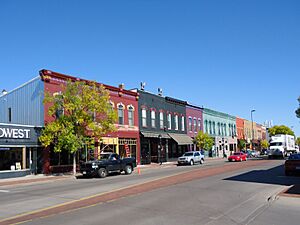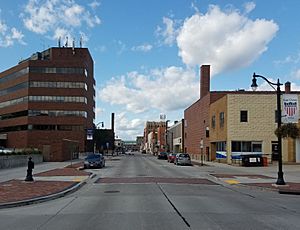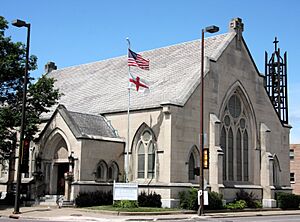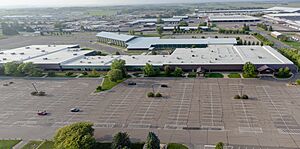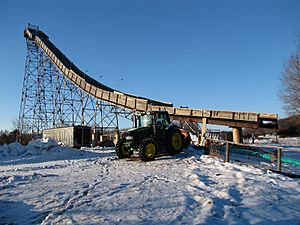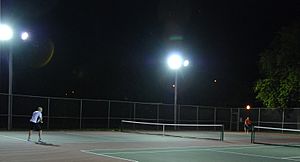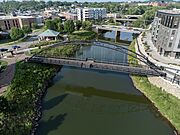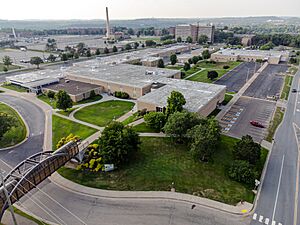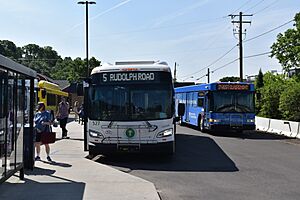Eau Claire, Wisconsin facts for kids
Quick facts for kids
Eau Claire, Wisconsin
|
|
|---|---|
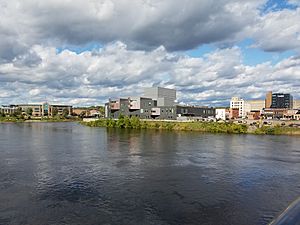
Downtown Eau Claire
|
|
| Motto(s):
"Voici l'eau claire!"
("Here is the clear water!") |
|
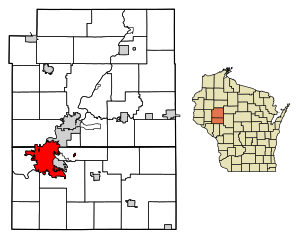
Location of Eau Claire in Eau Claire and Chippewa counties, Wisconsin.
|
|
| Country | |
| State | |
| Counties | Eau Claire, Chippewa |
| Government | |
| • Type | Council–manager |
| Area | |
| • City | 34.95 sq mi (90.53 km2) |
| • Land | 32.86 sq mi (85.10 km2) |
| • Water | 2.09 sq mi (5.42 km2) 6.15% |
| Elevation | 787 ft (240 m) |
| Population
(2020)
|
|
| • City | 69,421 |
| • Estimate
(2024)
|
73,011 |
| • Rank | WI: 8th |
| • Density | 2,112.8/sq mi (815.8/km2) |
| • Metro | 161,151 |
| Time zone | UTC−6 (CST) |
| • Summer (DST) | UTC−5 (CDT) |
| Zip code |
54701-54703
|
| Area code(s) | 715 & 534 |
| FIPS code | 55-22300 |
| GNIS feature ID | 1583124 |
| Website | http://www.eauclairewi.gov |
| Page text. | |
Eau Claire (pronounced "oh KLAIR") is a city in Wisconsin, USA. It's located in both Eau Claire and Chippewa counties. Eau Claire is the main city of Eau Claire County, where the county government is based.
In 2020, about 69,421 people lived here, making it the 8th largest city in Wisconsin. It's part of a bigger area called the Eau Claire–Chippewa Falls metropolitan area, which had over 172,000 residents in 2020. This area is also known as the Chippewa Valley.
Eau Claire sits where the Eau Claire and Chippewa Rivers meet. This land was traditionally home to the Ojibwe, Dakota, and Ho-Chunk Native American tribes. The first European-American settlers arrived in 1845, and the city officially became a city in 1872.
The city grew quickly because of its large logging and timber industries. Later, in the early 1900s, when logging slowed down, Eau Claire's economy changed. It became a center for manufacturing and education, especially after the University of Wisconsin–Eau Claire opened in 1916. Today, Eau Claire is also a busy place for business and is home to the main office of Menards, a big home improvement store chain.
Eau Claire is well-known for its lively arts and music scene. It's the hometown of the indie folk band Bon Iver. The band's lead singer, Justin Vernon, helped create the city's yearly Eaux Claires Music & Arts Festival. Between 2010 and 2020, Eau Claire was the second fastest-growing major city in Wisconsin, right after Madison.
Contents
- What's in a Name?
- City History
- Where is Eau Claire?
- Who Lives in Eau Claire?
- What Does Eau Claire Do?
- Arts and Fun in Eau Claire
- Sports in Eau Claire
- Parks and Outdoor Fun
- Schools and Colleges
- Media in Eau Claire
- Getting Around Eau Claire
- Healthcare in Eau Claire
- Famous People from Eau Claire
- Sister Cities
- Images for kids
- See also
What's in a Name?
The name "Eau Claire" comes from Eau Claire County. It's a French phrase, "Eaux Claires," which means "Clear Waters." This name refers to the Eau Claire River.
There's a local story that says early French explorers were traveling down the Chippewa River, which was muddy from rain. When they reached the point where the Eau Claire River joined it, they saw its clear water and excitedly shouted, "Voici l'eau claire!" This means "Here is the clear water!" This phrase is now the city's motto and is even on the city's official seal.
City History
Europeans first visited the Eau Claire area in the late 1600s. Before that, Native American tribes had lived there for thousands of years. European fur traders later settled in the area to trade with these local tribes.
In 1825, a treaty called the First Treaty of Prairie du Chien set boundaries for different Native American groups. It said the Chippewa River was the border between the Sioux and Chippewa tribes. The "Clear Water River" (Eau Claire River) was the border between the Chippewa and Winnebago tribes.
The first European-American settlers arrived in 1845. The city officially became a city in 1872. During this time, logging was the main industry. Many sawmills were built to process the huge amounts of timber. By the late 1800s, Eau Claire was an industrial city, thanks to its sawmills and other factories.
The city started as three separate settlements near where the Eau Claire and Chippewa rivers meet. The main part of downtown is where the first European-American village was. In 1845, Stephen McCann and J. C. Thomas built three buildings there. The McCann family moved into one, becoming the first permanent settlers.
West Eau Claire was founded in 1856, across the river. It became part of the city in 1872. Further downstream, the Daniel Shaw & Co. lumber company started Shawtown. By the 1930s, Shawtown was added to the city of Eau Claire. By the 1950s, Eau Claire had grown so much that it touched the nearby city of Altoona.
In 1916, the University of Wisconsin–Eau Claire was founded. This marked a big change for the city's economy. It shifted from mainly lumber production to focusing on manufacturing, education, and healthcare.
In 1917, the Gillette Safety Tire Company built a large factory in Eau Claire. It made rubber tires and inner tubes. By 1920, about 1,600 workers produced nearly 500 tires and 500 tubes daily. The factory grew, and in 1931, United States Rubber Company bought Gillette. During World War II, the U.S. government used the factory to make ammunition. At its busiest, over 6,000 people worked there. After the war, the factory went back to making tires and was renamed Uniroyal in 1967.
In 1991, Uniroyal, one of Eau Claire's biggest factories, closed down. This meant 1,358 people lost their jobs. Even though this was a big loss, the city's unemployment rate actually dropped the next year. Today, the old factory building is called Banbury Place. It's now used by many small businesses and organizations.
Where is Eau Claire?
Eau Claire is about 90 miles (145 km) east of Minneapolis and St. Paul, Minnesota. It's on the edge of the Driftless Zone, an area in the Midwest that wasn't flattened by glaciers.
The city covers about 34.14 square miles (88.42 square kilometers). Most of this is land (32.04 sq mi or 82.98 sq km), and a smaller part is water (2.10 sq mi or 5.44 sq km).
The land in Eau Claire has many river valleys. There are steep slopes leading from the city center to the eastern and southern parts. As the city grows, it's expanding into more hilly areas.
There are two lakes in the city: Dells Pond and Half Moon Lake. Dells Pond is a lake created by a hydroelectric dam. It used to hold logs for the lumber industry. Half Moon Lake is an oxbow lake. This means it was once a bend in the Chippewa River that got cut off over time.
Weather in Eau Claire
Eau Claire has a climate with four clear seasons. Summers can be warm or hot, and winters are generally cold. The average yearly temperature is about 46°F (8°C).
Temperatures can be extreme, sometimes going above 110°F (43°C) in summer or below -40°F (-40°C) in winter. The city gets more snow (about 55.4 inches or 141 cm) than rain (about 33 inches or 84 cm) each year. Overall, it gets more precipitation than other big cities in Wisconsin like Milwaukee and Madison.
In July, the average temperature is about 71.3°F (21.8°C). In January, the average is about 14.6°F (-9.7°C). Temperatures can stay below freezing for a long time in winter.
| Climate data for Eau Claire Regional Airport, Wisconsin (1991–2020 normals, extremes 1893–present) | |||||||||||||
|---|---|---|---|---|---|---|---|---|---|---|---|---|---|
| Month | Jan | Feb | Mar | Apr | May | Jun | Jul | Aug | Sep | Oct | Nov | Dec | Year |
| Record high °F (°C) | 55 (13) |
63 (17) |
84 (29) |
91 (33) |
107 (42) |
105 (41) |
111 (44) |
104 (40) |
101 (38) |
89 (32) |
79 (26) |
64 (18) |
111 (44) |
| Mean maximum °F (°C) | 42 (6) |
47 (8) |
64 (18) |
80 (27) |
88 (31) |
92 (33) |
93 (34) |
91 (33) |
87 (31) |
79 (26) |
62 (17) |
47 (8) |
95 (35) |
| Mean daily maximum °F (°C) | 23.4 (−4.8) |
28.4 (−2.0) |
41.3 (5.2) |
56.5 (13.6) |
69.6 (20.9) |
78.7 (25.9) |
82.8 (28.2) |
80.4 (26.9) |
72.3 (22.4) |
58.0 (14.4) |
42.0 (5.6) |
28.7 (−1.8) |
55.2 (12.9) |
| Daily mean °F (°C) | 14.6 (−9.7) |
18.8 (−7.3) |
31.2 (−0.4) |
44.8 (7.1) |
57.4 (14.1) |
67.1 (19.5) |
71.3 (21.8) |
69.1 (20.6) |
60.8 (16.0) |
47.5 (8.6) |
33.4 (0.8) |
20.6 (−6.3) |
44.7 (7.1) |
| Mean daily minimum °F (°C) | 5.8 (−14.6) |
9.1 (−12.7) |
21.2 (−6.0) |
33.2 (0.7) |
45.1 (7.3) |
55.5 (13.1) |
59.8 (15.4) |
57.7 (14.3) |
49.3 (9.6) |
36.9 (2.7) |
24.7 (−4.1) |
12.6 (−10.8) |
34.2 (1.2) |
| Mean minimum °F (°C) | −17 (−27) |
−13 (−25) |
−1 (−18) |
18 (−8) |
30 (−1) |
42 (6) |
49 (9) |
46 (8) |
34 (1) |
22 (−6) |
7 (−14) |
−11 (−24) |
−20 (−29) |
| Record low °F (°C) | −45 (−43) |
−40 (−40) |
−35 (−37) |
0 (−18) |
20 (−7) |
25 (−4) |
41 (5) |
36 (2) |
22 (−6) |
7 (−14) |
−18 (−28) |
−32 (−36) |
−45 (−43) |
| Average precipitation inches (mm) | 1.03 (26) |
1.10 (28) |
1.97 (50) |
3.08 (78) |
3.91 (99) |
4.83 (123) |
3.61 (92) |
4.18 (106) |
3.65 (93) |
2.49 (63) |
1.79 (45) |
1.35 (34) |
32.99 (838) |
| Average snowfall inches (cm) | 13.5 (34) |
11.2 (28) |
9.6 (24) |
4.3 (11) |
0.4 (1.0) |
0.0 (0.0) |
0.0 (0.0) |
0.0 (0.0) |
0.0 (0.0) |
0.7 (1.8) |
4.7 (12) |
11.0 (28) |
55.4 (141) |
| Average extreme snow depth inches (cm) | 10.1 (26) |
11.7 (30) |
9.4 (24) |
2.2 (5.6) |
0.3 (0.76) |
0.0 (0.0) |
0.0 (0.0) |
0.0 (0.0) |
0.0 (0.0) |
0.4 (1.0) |
2.5 (6.4) |
7.5 (19) |
14.4 (37) |
| Average precipitation days (≥ 0.01 in) | 10.7 | 8.2 | 9.6 | 11.8 | 13.3 | 12.3 | 11.3 | 10.4 | 10.9 | 10.1 | 8.9 | 10.1 | 127.6 |
| Average snowy days (≥ 0.1 in) | 10.9 | 8.3 | 5.8 | 2.9 | 0.1 | 0.0 | 0.0 | 0.0 | 0.0 | 0.7 | 4.7 | 9.0 | 42.4 |
| Source: NOAA | |||||||||||||
Who Lives in Eau Claire?
| Historical population | |||
|---|---|---|---|
| Census | Pop. | %± | |
| 1870 | 2,293 | — | |
| 1880 | 10,119 | 341.3% | |
| 1890 | 17,415 | 72.1% | |
| 1900 | 17,517 | 0.6% | |
| 1910 | 18,310 | 4.5% | |
| 1920 | 20,906 | 14.2% | |
| 1930 | 26,287 | 25.7% | |
| 1940 | 30,745 | 17.0% | |
| 1950 | 36,058 | 17.3% | |
| 1960 | 37,987 | 5.3% | |
| 1970 | 44,619 | 17.5% | |
| 1980 | 51,509 | 15.4% | |
| 1990 | 56,856 | 10.4% | |
| 2000 | 61,704 | 8.5% | |
| 2010 | 65,883 | 6.8% | |
| 2020 | 69,421 | 5.4% | |
| 2024 (est.) | 73,011 | 10.8% | |
| U.S. Decennial Census | |||
2020 Population Facts
In 2020, Eau Claire had a population of 69,421 people. The city had about 2,113 people per square mile (816 per square kilometer).
Most residents (85.9%) were White. Other groups included Asian (5.7%), Black or African American (1.5%), and Native American (0.6%). About 5.1% of people were from two or more races. About 3.3% of the population was Hispanic or Latino.
The average household income in the city was about $59,705. For families, it was about $82,851. About 15.5% of the population lived below the poverty line. This included 11.4% of those under 18 years old.
Most adults (95.5%) had finished high school or higher education. About 33.9% had a bachelor's degree or more.
Most of Eau Claire's population (67,238 people) lives in Eau Claire County. A smaller number (2,183 people) live in Chippewa County.
Larger Metro Area
Eau Claire is the main city of the United States Census Bureau's Eau Claire Metropolitan Statistical Area. This area includes all of Eau Claire and Chippewa Counties, with a total population of 161,151 in 2010.
When you add the nearby Menomonie area (which includes Dunn County), it forms the larger Eau Claire-Menomonie Consolidated Metropolitan Statistical Area. In 2010, this combined area had 205,008 people.
Religious Places
Eau Claire is home to the main office of the Episcopal Diocese of Eau Claire. Its main church is Christ Church Cathedral. The city also has Catholic churches like Sacred Heart Church and St. Patrick's Church. Other churches include Community House, First Congregational Church, First Methodist Episcopal Church, and the Lutheran Church of the Good Shepherd.
Diverse Communities
Hmong Community
Hmong Americans are the largest ethnic minority group in Eau Claire. In 2010, there were 2,181 Hmong people in Eau Claire County. While Milwaukee has more Hmong people, they make up a larger percentage of the population in Eau Claire County. This makes them a very noticeable group in the city. Most Hmong in the county live in the city of Eau Claire. In some neighborhoods, up to 30% of residents are Hmong.
By 2022, the Hmong population grew to 2,868, making up over 90% of the Asian population in the area.
German Community
Eau Claire has a large German American population. About 30% of the city's residents have German heritage. In 2022, there were about 25,676 German Americans living here.
Norwegian Community
The city also has a big Norwegian American community. About 16% of the population has Norwegian roots. In 2022, there were about 11,672 Norwegian Americans in Eau Claire.
What Does Eau Claire Do?
Eau Claire calls itself the "horseradish capital of the world." This is because Silver Spring Foods, the world's largest grower and producer of horseradish, is located here. The cold winters in Eau Claire are good for growing horseradish. Other important crops grown in the area include apples, pumpkins, and plums.
Menards, a chain of home improvement stores found across the Midwest, has its main office in Eau Claire. It was started by John Menard Jr., who is from Wisconsin. Another company based in Eau Claire is National Presto Industries.
Oakwood Mall is the main shopping mall in Eau Claire. It opened in 1986 and has 91 stores and services. Downtown Eau Claire and Water Street also have many unique shops. These include bike shops, arcades, record stores, and antique shops.
Arts and Fun in Eau Claire
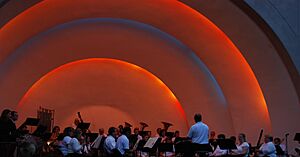
Live Performances
Eau Claire has a growing and active theater community. While there aren't professional theater groups based here, many amateur and community theaters are very active. The most well-known are the Chippewa Valley Theatre Guild (CVTG) and the Eau Claire Children's Theatre (ECCT).
The University of Wisconsin–Eau Claire also has a strong theater program. Plus, professional touring shows often visit the city. The Pablo Center at the Confluence and Haas Fine Arts Center are the main indoor places for performances. Both CVTG and ECCT also have their own theater spaces.
The Pablo Center at the Confluence opened in downtown Eau Claire in 2018. It was built to be the main place for performing arts, replacing the UW-Eau Claire's Kjer Theater. It has a large 1,200-seat theater, rehearsal rooms, art galleries, and labs for sound, lighting, and costume design.
Music Scene
Eau Claire hosts several music festivals each year.
The Blugold Marching Band is a big part of the University of Wisconsin–Eau Claire's music program and the Eau Claire community. With 475 members, it's the largest marching band in the Midwest. The band has toured across the Midwest and performed on world stages.
Outdoor Art
The Sculpture Tour Eau Claire is an ongoing outdoor art show. You can see 53 sculptures placed along the streets of downtown Eau Claire. This tour is the second-largest of its kind in the country.
Farmers Market
The Eau Claire Downtown Farmers Market is located in Phoenix Park. It's open from May to October. You can find a variety of fresh produce and local products there.
Sports in Eau Claire
Baseball
Eau Claire has four amateur baseball teams. The Eau Claire Express play in the Northwoods League, a summer baseball league for college players. Their home games are at Carson Park. The Eau Claire Cavaliers also play at Carson Park. The Eau Claire Bears and Eau Claire Rivermen play in the Chippewa River Baseball League.
Three high schools in Eau Claire have baseball teams. Eau Claire North H.S. won state championships in 2011 and 2019. Eau Claire also has a large youth baseball program, including Little League teams. Eau Claire Little League teams have won state championships twice (1998 and 2012).
Football
The Chippewa Valley Predators football team plays in the Northern Elite Football League. Their home games are at Carson Park. The team started in 2001. The Northern Lights Cowboys also play football at Carson Park in the Champions Amateur Football League.
As of 2023, the Eau Claire Cowboys football team plays in the Northern Lights Football League, also at Carson Park.
Horseshoes
Eau Claire hosted the World Horseshoe Championship in 2003. It also hosted the Wisconsin State Horseshoe Tournament in 2019.
Parks and Outdoor Fun
Eau Claire has several large parks. Owen Park is along the Chippewa River. It has a big bandshell where free outdoor concerts are held all summer. Putnam Park follows Putnam Creek and Little Niagara Creek east from the UWEC campus.
Carson Park is unique because it's on an island in the middle of Halfmoon Lake (an oxbow lake). Phoenix Park is where the Eau Claire and Chippewa Rivers meet. It used to be the site of an old steel plant. Phoenix Park hosts a weekly farmers market and outdoor concerts in the summer.
Riverview Park is a popular spot for swimming in the summer. It also has picnic areas, grills, and public restrooms. Eau Claire has two dog parks: Otter Creek Off-Leash Dog Park and Sundet Off-Leash Dog Park.
The City of Eau Claire also runs Fairfax public pool and Hobbs Municipal Ice Center, an indoor ice rink.
Eau Claire is the starting point of the Chippewa River State Trail. This trail is great for biking and other outdoor activities. It follows the lower part of the Chippewa River.
Eau Claire also hosts the Eau Claire Marathon, which is a qualifying race for the Boston Marathon.
Schools and Colleges
Schools in Eau Claire are part of the Eau Claire Area School District. The city has two public high schools: Memorial High School and North High School. There are also two public charter high schools: McKinley Charter School and Technology Charter School.
The district has 13 elementary schools and three middle schools. The Chippewa Valley Montessori Charter School follows the teaching methods of Maria Montessori. Eau Claire also has two private high schools: Regis High School and Immanuel Lutheran High School.
Eau Claire is home to two public colleges: the University of Wisconsin–Eau Claire and the Chippewa Valley Technical College. There is also a private college, Immanuel Lutheran College.
The city has two libraries: McIntyre Library on the University of Wisconsin-Eau Claire campus and L.E. Phillips Memorial Public Library. The L.E. Phillips Memorial Public Library offers many events, like children's story times, book clubs, and makerspace labs.
Media in Eau Claire
Newspapers and Magazines
The Eau Claire Leader-Telegram newspaper is published five days a week and has been around since 1881. Volume One is a magazine published every two weeks. It has a circulation of 15,000 copies and is read by an estimated 45,000 people.
Television Channels
Eau Claire and La Crosse together form the 127th largest television market area.
| Channel | Callsign | Affiliation | Branding | Subchannels | Owner | |
|---|---|---|---|---|---|---|
| (Virtual) | Channel | Programming | ||||
| 8.1 | WKBT WBDL-LD |
CBS | News 8 Now | 8.2 8.3 8.4 8.5 8.6 |
MyNetworkTV Ion Dabl QVC HSN |
Morgan Murphy Media |
| 13.1 | WEAU | NBC | WEAU 13 News | 13.2 13.3 13.4 13.5 13.6 14.10 |
Cozi TV MeTV Movies!< Defy TV Outlaw TV The CW |
Gray Television |
| 14.1 | WECX-LD W33DH-D |
The CW | La Crosse Eau Claire CW | 14.2 14.3 14.4 13.10 |
Heroes & Icons Start TV MeTV NBC |
|
| 18.1 | WQOW | ABC | WQOW 18 | 18.2 18.3 18.4 18.5 |
Catchy Comedy This TV Court TV True Crime Network |
Allen Media Broadcasting |
| 28.1 | WHWC | PBS | PBS Wisconsin | 28.2 28.3 28.4 |
Wisconsin Channel Create PBS Kids |
Wisconsin Educational Communications Board |
| 48.1 | WEUX | FOX | FOX 25/48 | 48.2 48.3 48.4 |
Antenna TV Ion Mystery Bounce |
Nexstar Media Group |
| 53.1 | W23FC-D | Defy TV | 53.2 53.3 53.4 |
Ion Scripps News Law & Crime |
Innovate Corp. | |
Cable Channels
| Channel | Callsign | Branding | Programming | Owner |
|---|---|---|---|---|
| 993 | CVCTV | CTV | Local Access | Valley Media Works/ City of Eau Claire |
| 994 | CVCTV | NewsWorks | Public Affairs |
Radio Stations
FM Radio
| FM radio stations | ||||
|---|---|---|---|---|
| Frequency | Call sign | Name | Format | Owner |
| 88.3 FM | WHWC | Wisconsin Public Radio | Ideas Network | Wisconsin Public Radio |
| 88.7 FM | W204BP (KAWZ-FM Translator) |
CSN International | Christian | CSN International |
| 89.1 FM | W206AH (KLOV-FM Translator) |
Family Radio | Christian | Family Radio |
| 89.7 FM | WUEC | Wisconsin Public Radio | News & Classical Network | Wisconsin Public Radio |
| 90.5 FM | WVCF | VCY America | Christian | VCY America |
| 91.3 FM | WHEM | Moody Broadcasting Network | Christian | Moody Broadcasting Network |
| 92.1 FM | WMEQ | Classic Rock 92.1 | Classic rock | iHeartMedia, Inc. |
| 92.9 FM | WECL | The X | Active Rock | Mid-West Family Broadcasting |
| 94.1 FM | WIAL | I-94 | Hot AC | |
| 95.1 FM | WQRB | B95 | Country | iHeartMedia, Inc. |
| 95.9 FM | W240DC (WEAQ-AM Translator) |
The Farm 95.9 | Classic country & Ag News/Talk | Mid-West Family Broadcasting |
| 96.3 FM | WHYS | Eau Claire Community Radio | Community | Northern Thunder, Inc. |
| 96.9 FM | WJLM | 3ABN | Christian | 3ABN |
| 97.3 FM | WHRC | |||
| 98.1 FM | WISM | Greatest Hits 98.1 | Classic Hits | Mid-West Family Broadcasting |
| 98.7 FM | W254CN (WBIZ-AM Translator) |
98.7 The Fan | Sports | iHeartMedia, Inc. |
| 99.1 FM | W256AE (WCFW-FM Translator) |
105.7 Your Variety Station | Adult contemporary | Magnum Radio |
| 99.9 FM | WGNW | The Family | Contemporary Christian | The Family Radio Network, Inc. |
| 100.7 FM | WBIZ | Z100 | Top 40/CHR | iHeartMedia, Inc. |
| 101.9 FM | WRFP | Converge Radio | Community-Government | Eau Claire Public Access Center, Inc. |
| 102.7 FM | WIEC | WIEC Fat Free Radio | Community | The Eau Claire Broadcasting Association |
| 103.1 FM | W276CP (WOGO-AM Translator) |
680 WOGO | News/Talk | Stewards of Sound, Inc. |
| 103.7 FM | WWIB | 103.7 WWIB | Christian | |
| 104.5 FM | WAXX | WAXX 104.5 | Country | Mid-West Family Broadcasting |
| 105.1 FM | W286CK (WAYY-AM Translator) |
Sports Radio 105.1 | Sports | |
| 105.7 FM | WCFW | 105.7 Your Variety Station | Adult contemporary | Magnum Radio |
| 106.3 FM | W292EG (WMEQ-AM Translator) |
880 WMEQ | News/Talk | iHeartMedia, Inc. |
| 106.7 FM | WATQ | Moose Country 106.7 | Classic country | |
| 107.9 FM | W300DB (WDVM-AM Translator) |
Relevant Radio | Catholic | Starboard Broadcasting |
AM Radio
| AM radio stations | ||||
|---|---|---|---|---|
| Frequency | Call sign | Name | Format | Owner |
| 680 AM | WOGO | 680 WOGO | News/Talk | Stewards of Sound, Inc. |
| 790 AM | WAYY | Sports Radio 105.1 | Sports | Mid-West Family Broadcasting |
| 880 AM | WMEQ | 880 WMEQ | News/Talk | iHeartMedia, Inc. |
| 1050 AM | WDVM | Relevant Radio | Catholic | Starboard Broadcasting |
| 1150 AM | WEAQ | The Farm 95.9 | Classic country & Ag News/Talk | Mid-West Family Broadcasting |
| 1400 AM | WBIZ | 98.7 The Fan | Sports | iHeartMedia, Inc. |
Getting Around Eau Claire
Air Travel
Eau Claire has its own airport, the Chippewa Valley Regional Airport (EAU).
City Buses
- Eau Claire Transit operates bus lines throughout the city.
Intercity Buses
You can travel to and from Eau Claire by bus with these companies:
- Flixbus (connects Chicago to Minneapolis, going through Eau Claire)
- Greyhound Lines (connects Chicago to Minneapolis, going through Eau Claire)
- Megabus (operated by Wisconsin Coach Lines, connects Milwaukee to Minneapolis via Green Bay)
Main Roads
 Interstate 94
Interstate 94 U.S. Route 12 ("Clairemont Avenue")
U.S. Route 12 ("Clairemont Avenue") U.S. Route 53 ("The Bypass")
U.S. Route 53 ("The Bypass")
 Business US-53 ("Hastings Way")
Business US-53 ("Hastings Way") Highway 29 (goes around Eau Claire to the north)
Highway 29 (goes around Eau Claire to the north) Highway 37 ("Hendrickson Drive")
Highway 37 ("Hendrickson Drive") Highway 85 (ends near Eau Claire)
Highway 85 (ends near Eau Claire) Highway 93
Highway 93 Highway 124 (now ends in nearby Lake Hallie)
Highway 124 (now ends in nearby Lake Hallie) Highway 312 (also known as the "North Crossing")
Highway 312 (also known as the "North Crossing")
Train Service
Eau Claire is on freight train lines owned by the Union Pacific Railroad. In the past, passenger trains ran from Chicago through Eau Claire to the Twin Cities until 1963. The old Eau Claire station opened in 1893 but was torn down in 1987.
Both the Minnesota and Wisconsin Departments of Transportation want to bring passenger train service back to Eau Claire by 2030. In March 2021, Amtrak announced plans for a new passenger service. This route would connect Eau Claire to Chicago, Milwaukee, Madison, and St. Paul.
Healthcare in Eau Claire
Mayo Clinic Health System has a hospital in Eau Claire. It's a Level 2 trauma center, meaning it can handle serious injuries. This hospital also trains new family medicine doctors. It was named the #4 best hospital in Wisconsin and a top regional hospital in northwestern Wisconsin.
Eau Claire also has another hospital, Marshfield Medical Center, which is a Level 3 trauma center. Both hospitals offer many different types of specialized medical care and services.
Famous People from Eau Claire
Sister Cities
Eau Claire has "sister city" relationships with two other cities around the world. This means they share cultural and educational ties.
 Lismore, Australia
Lismore, Australia Miramar District, Costa Rica
Miramar District, Costa Rica
Images for kids
See also
 In Spanish: Eau Claire (Wisconsin) para niños
In Spanish: Eau Claire (Wisconsin) para niños
 | Bayard Rustin |
 | Jeannette Carter |
 | Jeremiah A. Brown |





